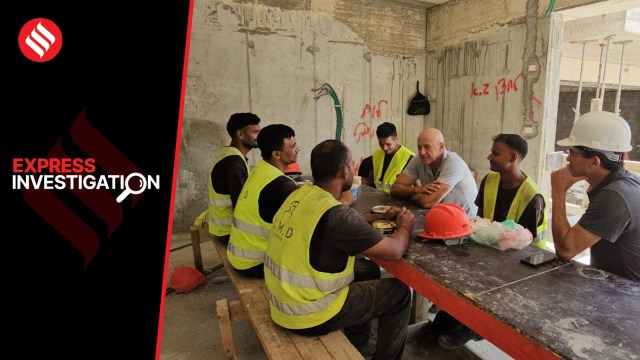* Chote Lal Bind (42), a mason from UP’s Jaunpur, reached Israel in July for construction work after clearing a 15-minute plastering test in Lucknow. He was sacked after 12 days following an “altercation with a Chinese foreman”. He got a job as a cleaner at a cosmetics factory near Jerusalem for Rs 800 an hour. “It’s not what I came for,” he said.
* Veena Nath Gupta (45), from UP’s Mau, was also selected for construction work in Israel after a “skill test” in Lucknow. He reached the country in April, and was moved to different cities. “I don’t even know where I am now. It’s somewhere near Tel Aviv. I am working as a labourer, mostly carrying loads,” he said.

* Amresh Madeshiya (44), a carpenter from Siwan in Bihar, cleared a “skill test” in Lucknow but worked as a labourer for eight weeks near Tel Aviv. “Language was a problem…I was sweeping and mopping, carrying cement bags and iron rods. I thought: have I come to do labour-grade jobs and die?” he said. He returned last month.
A showpiece bilateral jobs scheme, under which Indians would be taken to Israel to work in the construction sector, after over 100,000 Palestinian workers were banned in the wake of the Hamas attack of October 7 last year, is threatening to unravel.
The key reason is a glaring skill mismatch after an assessment process that over-promised and under-delivered when it came to workers’ abilities, an investigation by The Indian Express has found.
Israel has since taken the unprecedented step of allowing these workers — drawn to move by an average monthly salary, after deductions, of over Rs 1.9 lakh — to be re-deployed in unskilled or industrial jobs in non-construction sectors to avoid “damage” to “important relations” between both countries.
When contacted, an Israeli Embassy official said that they are aware of the complaints from Israeli contractors and changes in policy on re-deployment and added that that the Embassy was not involved in the recruitment of workers.
Story continues below this ad
The Indian Express reviewed official data and interviewed officials in Israel and labour-providing states in India, construction executives, and workers who have returned. It found gaps between planning and practice, with the “crisis-like” situation potentially affecting the reputation of Indian labour abroad and putting a question mark on the nature of the scheme.
Today, almost four months after the first flight with workers landed in Tel Aviv, Israeli executives point to a need for “course correction” while officials in India admit there is “room for improvement.” Manpower agencies estimate that between 500-600 workers, mostly recruited through government channels, may have already returned home.
According to data from the Israeli Embassy, around 5,000 workers each have been recruited through two “pathways”: Government-to-Government (G2G) handled by National Skill Development Corporation (NSDC) and Business-to-Business (B2B) through private agencies overseen by the Ministry of External Affairs.
Responding to queries from The Indian Express, NSDC listed 3,000 slots each for framework construction and iron bending, and 2,000 positions each for plastering and ceramic tiling in the first round of recruitment. For these, three rounds of “professional tests” were carried out in Haryana, UP and Telangana. Bind, Gupta and Madheshiya were among 4,825 candidates who travelled to Israel through G2G with another 1,276 ready for travel.
Story continues below this ad
‘Question mark on reputation’
Israeli construction executives say the lack of experience was acute, particularly from the G2G pathway. “Through the G2G bilateral route came very young Indians, many 20-year-olds who had never worked in construction…They came from jobs like farming and hair-cutting, some did not even know how to hold a hammer,’’ said Eldad Nitzen, chairman of Union Association of Foreign Employment Agencies in the Construction Industry in Israel.
Nitzen said the results were positive when the first batch of B2B workers arrived. But by May, he said, the “unsuitability’’ of workers had created a “terrible” situation. “Israeli builders refused to let them work on construction sites… the (Israeli) government finally gave us permission to put the G2G workers in unskilled jobs — factories, cleaning, loading-unloading, etc. The reputation of Indian workers became bad because Israeli builders don’t know who was B2B and who was G2G. After this experience, the builders got scared of getting unskilled Indian workers and asked us to bring Chinese, Moldovan and Uzbek workers and those from other countries. I have heard more than 500 G2G workers have gone back to India,’’ Nitzen said.
Asked what went wrong in the G2G process, when Israeli assessors representing employers were involved, Ibrahim Jamil Amleh, who owns a construction and recruitment company in Israel, said, “It seems the evaluators from Israel and the Indian government may not have effectively assessed the candidates’ experience in construction.”
Indian B2B recruiters say the situation has affected them, too. Vishal Mehra, executive director of Mumbai-based recruitment company Protech Engineering, said that following the “debacle” of G2G workers, contractors and clients have cancelled visas and contracts of as many as 2,000 Indian workers, mostly after May this year.
Story continues below this ad
“Though testing was done at Israel-approved centres, the fact is that unskilled persons, even fruit sellers and rickshaw-pullers, landed up in Israel. This had an impact on the departure of B2B workers as well. Our company has sent 900 workers but we still have 400-500 more selected and waiting,” he said.
“There is a slowdown. It is apparent that those sent through the bilateral route were not skilled enough. They did not have English proficiency and faced many challenges,” said Vijay D’Souza, senior manager at Mangalore-based 4 Corners Manpower Agency.
An ‘exceptional decision’
The situation finally led to Israel’s Population & Immigration Authority (PIBA) issuing an official note on June 24 for an “exceptional decision.” Its title: “Allowing the employment of new bilateral foreign construction workers in infrastructure and renovation works/ transferring foreign workers from the construction sector to the industry sector for the purpose of solving the crisis of not hiring the workers.”
The notice’s intention was to “provide a response to unemployment (of) workers” and “not to damage the important relations” between Israel and India. “(Israeli) Construction Corporations contacted PIBA with a request to stop or cancel the arrival of additional foreign workers from India… in addition the Authority and the Ministry of Labor received complaints from foreign workers who claimed that Corporations fired them shortly after their arrival or left them in their residences without employment…”, it stated.
Story continues below this ad
The note allowed these workers to be employed in renovation, infrastructure and factories. But construction firm owner Jamil Amleh said this has “compounded the problem”. “Now, all the workers prefer the industrial (sector), creating staffing issues in both sectors,” he said.
Igal Slovik, CEO of Israel Builders Association who had travelled to India to supervise the G2G trials, said there are talks on another round of recruitment but no dates have been finalised. “It is all about better strategic planning on both sides,” said Slovik, referring to the first round of recruitment. The Indian Express has learnt the next round is reportedly scheduled in Maharashtra this month although NSDC said they were not in the know, yet, of such a move.
Responding to queries from The Indian Express through the Chief Minister’s Office (CMO), the Haryana government admitted that some “improvements” could be made for future recruitment. “The identification and prior skill testing of candidates, the standardisation of training and clarity in understanding the individual requirements for overseas placement initiatives are areas where improvements can be considered,” it said, adding that 222 residents of the state had been selected so far and about 150 had reached their worksites.
TOMORROW: DISTRESS CALLS FROM BUILDERS & THE WAY OUT

































